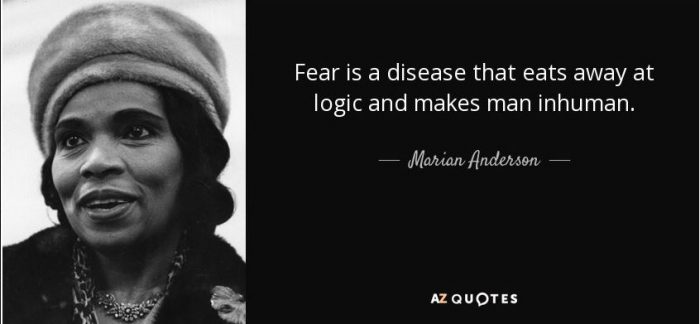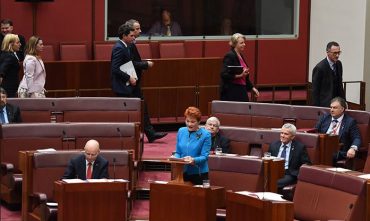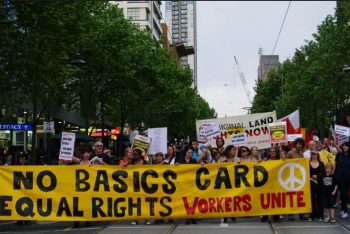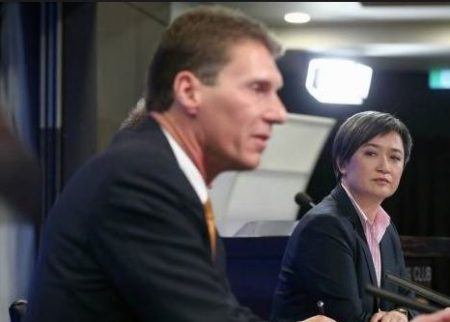Politics Driven Fear and the Pain it Brings

People are expressing the increasing need to separate themselves and self-identify as situated above certain groups. They feel the need to paint others as lesser. This need is fed by fear driven politics and it is causing a loss of focus and it is causing a lot of pain.
Memes used to be funny. They were quirky, sometimes delightful, sometimes thought provoking and sometimes so funny one would cry from laughing. Now memes are more about social status. Sharing to place oneself in a better class. A class above Jobseekers, Unionist, Muslims, Indigenous and LGBTI people who just want to get married amongst other groups.
Not an hour goes by on social media when I do not scroll by some defamatory post about Muslims (mostly aimed at degrading Muslim women) or how jobseekers are bludgers and should just get a job. Then I scroll by more shares about how unionists are self-serving, dodgy criminals. Then I come across those who belong to the special group who believe they are more Australian than the Indigenous Australians who were here in the first place.
Every day we scroll through the privileged Olympics, but there are no winners. Only losers.
The privileged I am talking about here, are not the Turnbull type of privileged; but so many every day Australians who share derogatory memes about various groups on a daily basis. These people come from all walks of life. They are not necessarily rich and they may be poor. Wealth status is not the issue here.
These people are privileged by default, because they do not belong to the group that they and others scorn, ridicule, shame, shun, ostracise and stigmatise. It is like every share elevates one to being a gold card member of the ‘in-group.’
The problem is that the privileged do not see. They are blinded. They cannot calm their egos enough to bring themselves down to another level to try to understand the life of another. They do not attempt to listen and empathise; they are on autopilot with judgement and ridicule.
Social media has made it so it is so much more important to hold dear to the opinion originally developed, than to attempt to understand an issue enough or look at it through different eyes; to recognise it is causing harm and change that opinion.
If we are complaining we haven’t progressed since Whitlam, it is largely our fault. It is our fault that there are so many people in pain, because every day I see stereotypes and stigmatisation shared around to approve and contribute to the infliction of pain on others.
We pit the oppressed against the oppressed when a meme is shared to give the homeless more than refugees. How does one judge the value of what assistance should be given? What drives us to choose between a person who has seen their entire family raped, tortured, slaughtered and burnt and fled their homeland or give to a person in desperate need of shelter, food, clothing and care? Do they both not deserve love, kindness and generosity?
What fear is within us that makes us share such memes as representations of our thoughts that we play judge and jury and decide who is not worthy of care and assistance? Is kindness such an ugly emotion that we reject it? Is it a fear that others may judge you as being too kind?
No, it is the fear driven politics that has led us to believe that a Government and its citizens cannot be generous enough to help both. It is the fear that if they do, we would somehow be worse off. It is fear driven politics that sees us remain silent on the generous assistance to the wealthy banks and business, whilst we verbally bash the poor.
We glorify a free-market-worker-hating-Government every time we share a meme about the ‘pathetic’ unemployed and how they are bludging and living off our taxes. We kick the worker every time we contemplate how unfair it may be that some greedy workers are getting paid penalty rates and how terrible this is for business and their profits. Pass me a goddamn tissue.
The Abbott-Turnbull Government is the epitome of the greedy bourgeoisie and there are every day citizens working so hard to work with them and for them to shove the worker and those who are jobless down as far as they can be kicked.
We have come to a peculiar space in time where the plebs themselves are standing with the bourgeoisie. For if they do this, then being a pleb, is better than a prole or the “hoi polloi.” The common worker, consumed by politics driven fear is tearing their own class apart.
“Workers United will never be defeated….” Go on…say it….it means something real.
What is the fear that drives us to glorify a Government who insists that the unemployed (human beings in case you have forgotten) should starve for a six months, six weeks and now a month?
Is it a fear that we may lose something if jobseekers are offered assistance from the public purse?
Is it a fear that we may just not have one more submarine to build if a jobseeker can live on real meat instead of noodles? Is it a genuine fear that Gina Rinehart might have less billions and that would somehow hurt us?
Is it the fear that we may confront the uncomfortable truth that our judgements reinforce the message that turning to sexual favours and even suicide is a reality for these individuals who are finding it so hard to survive in a world of not just poverty, but scorn and condemnation?
Above all else, it is the politics driven fear that those living in poverty are stealing something from us. It is the fear that they are getting something for less effort than us. It is the fear reinforced by the LNP message that there will be fewer hospitals, fewer schools and fewer jobs if we treat the unemployed with dignity. It is the politics driven fear that assisting jobseekers will result in less jobs; because that means we could one day be them.
There is no point attempting to provide input of an opposing view. Try to tell someone to be angry at the Government for not creating jobs, instead of blaming the unemployed. It is an interesting exercise. Contrition is not an emotion that we appear to embrace as Australian citizens.
This politics driven fear is also blinding us. We are losing focus. The fear of people from different lands and different religions is so critical we cannot take our eyes off them for a second. It is vital to share, share, share anything we can find, made up or not on the internet. It is critical to continuously reinforce this fear as legitimate and worthy to defend.
It is more important to have conversations on social media that can last days about how the viewpoint of one radical Muslim is the view of all Muslims; than to really engage thoughtfully and productively about how we can lift good Australian people out of poverty.
It is more important to remain silent on humanitarian issues,and use our fear of a religion we don’t understand as an excuse, because if we really stop and think about it; we may realise we are actually being inhumane and that is an ugly truth to face.
What fear is driving us that we are content with leaving other human beings in indefinite detention? Indefinite – without a hope, never to be released – just in case the key word has not hit you yet. Murderers get less.
The irrational politics driven fear that unionists are doing less work than the regular taxpayer for a greater gain, is more important to hold onto, than to stand with unionists who have given us the work-life we enjoy today and that they continuously fight for. This fear culminates and makes us forget that we once stood with pride and dignity and shed tears to remember those workers who were jailed, murdered, maimed, starved and broken just so our labour is recognised as a valuable input in exchange for fair wages and safe conditions. How soon we have forgotten the pain of John Howard’s Work Choices?
Every single time we share memes, or have conversations that reinforce the politics driven fear espoused by the Liberals and the Nationals, and now the more right wing parties; we are condoning the infliction of pain on the vulnerable.
We have a responsibility to stop and take stock that this rhetoric that is being whipped into a frenzy day after day has gone too far. It is time to sit up and take notice, that by doing this, we are hurting the people we talk about helping in other conversations we have
It is time to stop and think about those on the right who say they have the solutions, actually don’t. It is time to really listen to their proposals. Tearing down the worker and punishing those who are unemployed due to Government failure is not a solution. Dividing people by race or religion is not a solution. Clinging to the harmful measures that create more poverty and more divisiveness are not solutions. Why this is not being realised is the real phenomenon.
Choose Populism if you want a Rock Star. Reject it if you want a leader.
Some appear to be genuinely good people. However, politics driven fear is driving some people to throw brimstone and fire at those they want to help, instead of at the Government and other right wing parties who are the central cause of the problem.
It is time to take a stand to honour those and respect those who cannot, to challenge the Turnbull Government and others every time they reinforce the degradation of a vulnerable group.
It is time to stop sharing derogatory memes and start having real conversations about how we can build a nation, and not share our acceptance of helping the Liberals and others on the right tear it down.
It is time to stop dividing and start uniting. It is time for a hand up and to bring back the fair go.
It is time for the mate-ship and camaraderie we apparently as Australians represent.
I miss that. Do you?















